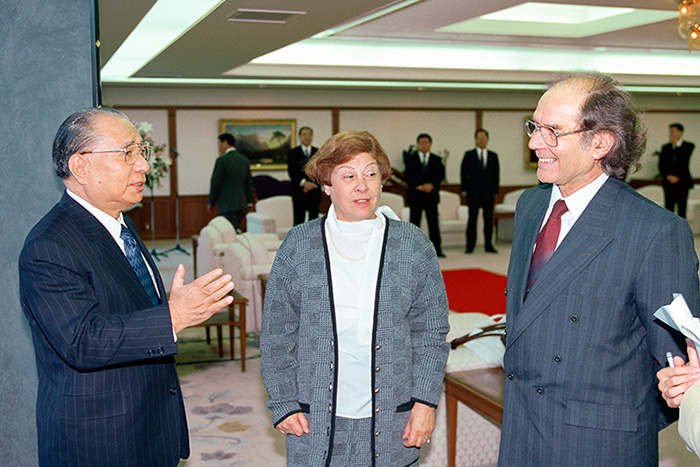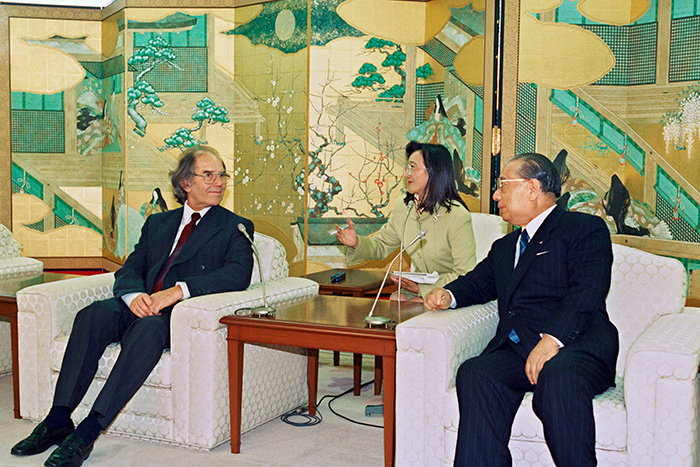Adolfo Pérez Esquivel—Argentine Human Rights Activist and Nobel Peace Laureate
(From the series, “Recollections of My Meetings with Leading World Figures—Part 2,” published in the Seikyo Shimbun on January 19, 1997)
“Under Argentina’s military dictatorship (1976–83), thirty thousand people were murdered. They were abducted and tortured to death.” The students of Tokyo’s Soka University listened transfixed to this gripping testimony of Dr. Pérez Esquivel [in June 1994]. Could such a terrible thing have taken place in this day and age? Even for those who were aware of this tragedy, the words of one who had experienced it were shocking.

Mr. Ikeda conversing with Dr. Perez and his wife, Amanda Guerreño (Sendagaya, Tokyo, December 1995)
“Of course, all thirty thousand were not killed at once. They disappeared one or two at a time. Though the number of victims rose to five, ten, one hundred, there was no cry of protest from society. And that is why thirty thousand people died.”
A husband, a wife, a child would simply disappear one day. The military authorities were very wily when it came to making people seem to vanish without a trace. Today, when no country can easily afford to ignore international opinion, it is not acceptable to oppress people too conspicuously. But if it can make those it regards as “troublemakers” simply “disappear” quietly, inconspicuously, a little at a time, the government can easily deny any involvement in the matter. The secret is to rob the protesters of their power to resist, to inflict irreparable damage on them and their cause, however ruthless the means.
Dr. Pérez Esquivel has written, “The authorities believed that they held the power of life and death in their hands. . . . Mothers, grandmothers and relatives knocked repeatedly on the doors of the churches, labor union offices, local and central government [asking them to help find their missing loved ones]. But the response was always the same: ‘We have no idea where they are. They must have had a reason to disappear. No doubt they did something wrong.’”[1]
Those missing, the ones who were the victims in this scenario, were simply dismissed as criminals, and those who did not know them personally were willing to believe this. Indeed, they were made to believe it. The government manipulated the mass media to drive that message home at every opportunity. Dr. Pérez Esquivel calls this the “shutting down of the conscience.”[2] The people, robbed of the spirit of critical thinking, convinced themselves that the government line was true. Since everyone said those who were missing were criminals, it must be true; there must be a reason for their disappearance. Instead of speaking out from principle and conscience, they decided to remain silent, not to get involved.
But Dr. Pérez Esquivel could not remain silent. He contacted the families of those who had disappeared, and he marched at the front of demonstrations of mothers demanding the return of their loved ones. Already at this time, Dr. Pérez Esquivel was actively campaigning against human rights abuses across Latin America. As a Christian, his beliefs also led him to the conclusion that action was the only path available to him.
In 1977, Dr. Pérez Esquivel was suddenly arrested, without a warrant or a hearing. He was thrown in prison, cast into a world of violent words and violent deeds.[3] There, the false face that the government showed its people was stripped away and its true brutality revealed in its rawest form. His cell was tiny, hardly large enough for him to take even four paces. It was freezing cold. He tried to keep the wind and rain out by covering the missing windowpanes with old newspaper and slapped himself to keep warm, but sleep was impossible. What’s more, his jailers woke him every two hours.
Their only aim was to destroy the resisters, physically and mentally. One jailer said, “Here you are only a convict. Not even God can help you.” Some prisoners had cigarette burns all over their bodies. Others were left with permanent marks across their face from blindfolds they were forced to wear for long periods. Many have suffered lasting psychological damage. Dr. Pérez Esquivel was subjected to electric-shock torture. During all this, he constantly told himself not to be defeated, resolving to endure and be strong.

Dr. Adolfo Pérez Esquivel and SGI President Daisaku Ikeda hold discussions (Sendagaya, Tokyo, December 1995)
At our meeting [in Tokyo in December 1995], Dr. Pérez Esquivel said to me, “In prison, I gained the strength to survive under extreme conditions, the strength to resist. That strength is mental strength and spiritual strength. In prison, one is denied physical freedom. But the mind is free. The mind cannot be imprisoned.”
Sustained by prayer, Dr. Pérez Esquivel endured his prison life. The hardest thing to bear was the sound of others being beaten, their continual cries of pain and anguish. The authorities had no ears for human suffering; they looked on their prisoners as faceless numbers.
How dangerous is a society that has lost all sense of right and wrong.
Recently in Japan, a young boy committed suicide because he was unable to endure the pain of being a victim of schoolyard bullying any longer. Without any sense of inappropriateness, one of his classmates remarked in the course of expressing his sadness, “Now I have one less rival to worry about.” It is easy to decry such callousness. But who has the right to condemn this youth alone when the leaders of our society shamelessly and with no moral or ethical standards pursue nothing but their own gain?
At every opportunity, Dr. Pérez Esquivel calls out to youth not to be bystanders. He urges them to participate, to become the main actors in the human drama unfolding around them. He challenges them to become the shapers of history, to have the critical discernment to spot injustices when they happen, to take action and forge support and unity among people.
To wait for someone else to do something is irresponsible and represents spiritual self-defeat.
Social consciousness is important, says Dr. Pérez Esquivel. We must rebel against injustice, he urges. How true! When stones are cast at good people, when the rights of honest, hardworking people are trampled, we should be angry! When anyone anywhere around the world discriminates against another, we should burn with indignation! All good people must rage against injustice! Raise your voices! Drown out the loudspeaker lies of the oppressors with a resounding “No!” Nothing suits the authorities better than the apathy of the people, than their feeling of powerlessness and their acceptance of the violation of human rights.
Through his sufferings in prison, Dr. Pérez Esquivel acquired a keen personal understanding of Dr. Martin Luther King, Jr.’s words: It’s not the repression by the bad people that hurts—it’s the silence of the good.[4] When moral apathy spreads throughout society, when people don’t want to get involved, bad people are free to do as they please. As a result, the good who remain silent and apathetic become accessories to their crimes.
When first Soka Gakkai president Tsunesaburo Makiguchi was imprisoned for his beliefs during the Second World War, he asked his fellow prisoners: “Is doing evil the same as not doing good? Or are they different?” They are the same. Mr. Makiguchi knew that there was no middle ground between good and evil.
After fourteen months, Dr. Pérez Esquivel was finally released from prison, but the authorities continued to keep him under strict surveillance.
One person who champions the cause of justice, who stands up for what is right, is more powerful than the apathetic masses.
Dr. Pérez Esquivel is a highly acclaimed sculptor and painter. He has always believed that an artist is one who feels the joy, the sadness and the suffering of the people and gives them voice and form.[5]
I remarked to him and his wife, Amanda Guerreño, a musician: “If the two of you had simply remained artists, your lives might have been quiet and peaceful. But you dared to cast your lot with the struggle for human rights. You stood up to save those who are suffering. When one stands up for a cause, one exposes oneself to criticism and attack. Knowing this, you still chose to walk the thorny path. What a magnificent life you have led! A life dedicated to fighting oppression shines with golden brilliance.”
In 1980, Dr. Pérez Esquivel was awarded the Nobel Peace Prize. It gave an enormous positive boost to the struggle for human rights around the world. I asked him, “Weren’t the military authorities who had persecuted you the most displeased by your award?” “Most assuredly, yes,” he replied. “They opposed and protested the award more than anyone.” He noted that the Argentine mass media remained silent on the true merit of his activities and the international recognition he had received; if they did write about him, it was to distort the facts.
The day he left Japan, Dr. Pérez Esquivel sent me a message: “When someone I have great faith in is attacked, insulted and persecuted, I will say nothing to him. But when that person ceases to be criticized, then I will express dissatisfaction—because that means he has given up the fight. There is a passage from Cervantes’ classic novel Don Quixote, where it is observed that the yapping of dogs is proof that we are proceeding on horseback.”
These are inspiring words indeed, from a committed crusader for justice.
Share this page














